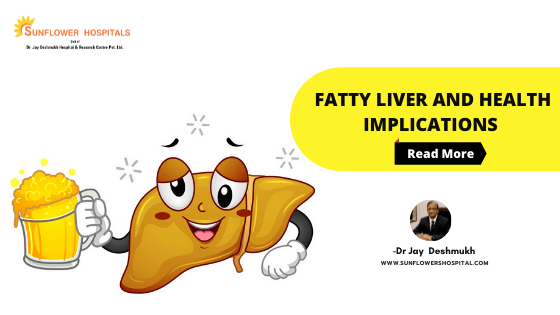Fatty liver as the name suggests means excessive accumulation of fat in the liver. It not only can lead to cirrhosis of liver but also may be responsible for dia-betes, high cholesterol and triglycerides, hypertension and increased incidence of coronary artery disease.
How do you diagnose a fatty liver?
Many individuals are not aware that they have fatty liver. This is because most of them have no syrup. toms. Few may have nausea, pain in the upper area of the abdomen. Few may have increased levels of liver enzymes in the blood. The commonest way of course is its accidental detection on ultrasound of the abdomen done for some other medical conditions.
What are the different types of fatty liver?
It is quite common in those who consume alcohol on daily basis. However, it is quite common in Monaco. Alcoholic individuals too. This is known as NAFLD or Non-Alcoholic Fatty Liver Disease. Excess fat in the liver also leads to inflammation of the liver, this is known as NASH or Non-Alcoholic Steato Hepatitis.
What are the symptoms of advanced fatty liver?
They would include all features of liver cirrhosis. This includes a collection of fluid in the abdomen and swelling of the feet. Jaundice, vomiting of blood, or presence of blood in stools are other features. The spleen also may be enlarged. Individuals tend to have a poor appetite, severe nausea, yellow eyes, and pain in the upper right abdomen.
Who gets NASH or NAFLD?
Experts have no answers so far, as to why some accumulate excess fat in their livers while others do not. There is limited information on how in some, the fatty liver gets transformed into cirrhosis of the liver. However being overweight or obese, insulin resistance where your cells do not take up sugar in response to insulin, high blood sugar indicating diabetes or pre-diabetes, and high levels of fat in the blood, particularly triglycerides are all linked to fatty liver in absence of alcohol consumption.
What are the risk factors and diseases that increase the risk of getting a fatty liver?
High levels of cholesterol and triglycerides in the blood, the metabolic syndrome, obesity where fat is concentrated in the abdomen, Polycystic ovarian syndrome, sleep apnoea, type 2 diabetes, poorly functioning thyroid are the risk factors.
What is the complication of fatty liver?
In fact, even if you do not drink alcohol or have a purely vegetarian diet, still you could have cirrhosis of the liver following a fatty liver Cirrhosis is late-stage scarring of the liver. As the liver tries to halt inflammation it produces areas of scarring or fibrosis. With continuous inflammation, fibrosis takes up more and more liver tissue. In fact the commonest reason for
liver transplant is cirrhosis of liver following fatty liver in nonalcoholic individuals.
How to reduce the risk of fatty liver?
Choose a diet rich in vegetables, fruits, whole grains, and healthy fats. If you are overweight, reduce your calorie intake and maintain a healthy weight. Exercise regularly on daily basis.
What tests are required to diagnose fatty liver?
As there are no symptoms in the majority, the diagnosis is often made on ultra. sound examination of the abdomen. Tests are done to assess the severity and pinpoint the diagnosis include complete blood count, liver function tests, tests for viral infections of the liver that include hepatitis A, B, C, and E. Tests for diabetes including HbA1C and complete lipid profile.
What about imagining procedures?
These include abdominal ultrasound as an initial screening procedure, CT, or MRI of the liver. These cannot distinguish between fatty liver with or without inflammation. Transient elastography measures the stiffness of the liver. Liver stiffness indicates scarring or fibrosis. Magnetic resonance elastography is the most accurate technique.
What about medications for fatty liver?
Unfortunately, there are no approved medications. Most of them are in the experimental phase and have not been proved to be beneficial. Vitamin E, coffee has been found to be beneficial, though not proven as such. In unfortunate individuals with cirrhosis, a liver transplant is the only answer Fatty liver can be considered as a lifestyle disorder. Regular exercises, a low-calorie diet, and taking appropriate care of diabetes and lipids are important.


